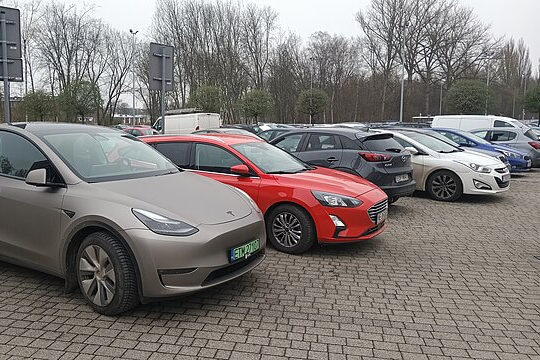
The spectre haunting electric cars is the question of greenwashing, prompting a critical examination of whether electric vehicles (EVs) genuinely produce fewer carbon emissions than their petrol or diesel counterparts.
So do electric cars really produce fewer carbon emissions than petrol or diesel?
To assess the carbon footprint of a product comprehensively, one must consider its entire life cycle, spanning manufacturing to scrapping or recycling.
Criticisms directed at electric cars often hone in on their manufacturing phase, neglecting the emissions associated with their actual use.
A kernel of truth in these critiques acknowledges that EVs demand significantly more energy during manufacturing. Battery production, in particular, involves substantial electricity consumption for processes such as baking electrode materials in ovens and charging and discharging batteries for readiness.
While electricity production can be emission-free, many countries still rely on carbon-intensive fossil fuels to power generators. According to analysis from the Argonne National Laboratory in Illinois, cited by the US Environmental Protection Agency, manufacturing battery-powered cars emits approximately 60% more carbon than their fossil fuel counterparts, creating a perceived “carbon debt.”
However, Eoin Devane, a senior analyst for surface transport at the Climate Change Committee, the UK government’s climate science adviser, said: “If you look at the data, that ‘carbon debt’ is paid off within about two years of driving the vehicle.”
However, the bulk of a fossil fuel car’s carbon footprint arises during its use, where constant emissions from exhaust pipes release carbon dioxide into the atmosphere. Transport & Environment (T&E), a campaign group, estimates that a new petrol car will produce around 27 tonnes of carbon if driven for 100,000 kilometres (62,000 miles) and 49 tonnes over 200,000 kilometres.
In contrast, electric cars consume less energy and can recharge from zero-carbon sources. The environmental impact of electric cars during operation hinges on the proportion of renewable electricity in local grids.
Even in a worst-case scenario—vehicles made and operated with electricity predominantly from coal—T&E’s cars director, Lucien Mathieu, asserts that electric cars outperform their counterparts after approximately 70,000 kilometres (about six years of driving).
The outlook for electric cars improves with the transition to wind and solar power, replacing gas and oil and reducing carbon emissions from electricity generation. Colin Walker, the head of transport at the Energy and Climate Intelligence Unit thinktank, said: “Even if you have a really dirty grid, EVs are still better for the environment. That will keep going as the grid gets cleaner and cleaner.”
Future advancements in battery technology are also pivotal; Auke Hoekstra, an energy transition researcher at Eindhoven University of Technology, argues that emissions from fossil fuel cars have limited potential for further reduction.
Batteries are “a good endgame solution” for the transition to net zero, Hoekstra said. “The gasoline engine is basically going nowhere.”
Conversely, ongoing developments in battery technology are likely to tip the balance further in favour of electric cars.
The overwhelming scientific consensus maintains that, in a realistic like-for-like comparison, a battery-powered car is cleaner than its petrol or diesel equivalent. While emissions persist in the manufacturing and operation of electric cars, they remain at a lower level than inefficient fossil fuel engines.
This holds true in today’s grid, particularly in wealthier economies, with the promise of even greater benefits in the future as countries continue to shift away from coal and gas for electricity generation. Placing batteries in cars emerges as a practical solution to transition millions of light vehicles towards net-zero emissions.
——————————————————————————
At Natural World Fund, we are passionate about stopping the decline in our wildlife.
The decline in our wildlife is shocking and frightening. Without much more support, many of the animals we know and love will continue in their decline towards extinction.
When you help to restore a patch of degraded land through rewilding to forests, meadows, or wetlands, you have a massive impact on the biodiversity at a local level. You give animals a home and food that they otherwise would not have had, and it has a positive snowball effect on the food chain.
We are convinced that this is much better for the UK than growing lots of fast-growing coniferous trees, solely to remove carbon, that don’t actually help our animals to thrive.
This is why we stand for restoring nature in the UK through responsible rewilding. For us, it is the right thing to do. Let’s do what’s right for nature!
Donate today at https://naturalworldfund.com/ and join in the solution!

